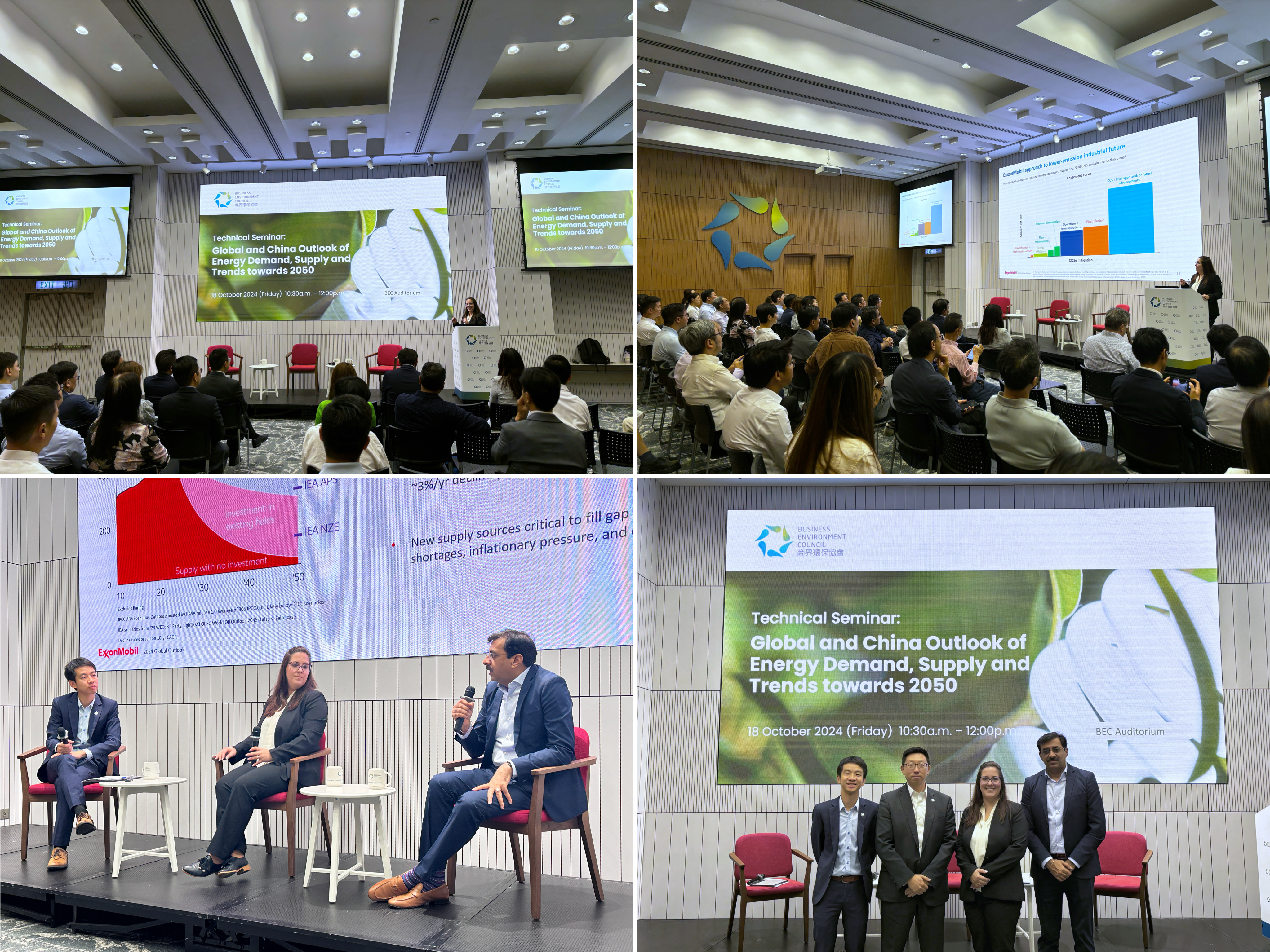selected item
At a technical seminar hosted by the Business Environment Council on October 18, Monica Muzny and Vineet Malik from ExxonMobil Corporate Strategic Planning Department shared ExxonMobil’s views on the energy demand, supply and trends worldwide and in China through 2050. They also discussed the various solutions for meeting the world's energy and product needs during its transition while reducing greenhouse gas (GHG) emissions.
Addressing over 70 industry leaders from sectors including energy, banking, public utilities, universities, and NGOs, Monica highlighted ExxonMobil’s key projections, stating that the world’s population is expected to reach 10 billion by 2050, leading to a 15% increase in energy demand to meet the needs of developing economies. This is where ExxonMobil comes in, working to solve the “and” equation by simultaneously increasing energy supply and reducing emissions. Projections also indicate that, although carbon emissions are expected to fall for the first time by 2030 despite economic expansion, oil and natural gas will still constitute over 50% of the global energy mix in 2050. This underscores the ongoing need for substantial investment in traditional energy sources.
The speakers also emphasized the importance of advancing lower-emission technologies. ExxonMobil is actively investing in solutions such as carbon capture and storage, hydrogen, and biofuels to support a lower-emission future in China and globally. They called for supportive policies, technological innovation, and market incentives to drive faster deployment of all available resources to achieve a below 2°C pathway.
The seminar concluded with an engaging Q&A session, facilitating a valuable exchange of diverse perspectives on the future of energy globally and in Hong Kong. Participants were also keen to know the available lower GHG emission solutions in Hong Kong, including the recently launched Esso Renewable Diesel R20, a drop-in fuel that provides a pragmatic way for light, medium and heavy-duty fleet customers to reduce their GHG emissions without modifying their existing diesel vehicles. The insights shared by the participants were enlightening, demonstrating the collaborative efforts that society needs to achieve a net-zero and sustainable future.
Addressing over 70 industry leaders from sectors including energy, banking, public utilities, universities, and NGOs, Monica highlighted ExxonMobil’s key projections, stating that the world’s population is expected to reach 10 billion by 2050, leading to a 15% increase in energy demand to meet the needs of developing economies. This is where ExxonMobil comes in, working to solve the “and” equation by simultaneously increasing energy supply and reducing emissions. Projections also indicate that, although carbon emissions are expected to fall for the first time by 2030 despite economic expansion, oil and natural gas will still constitute over 50% of the global energy mix in 2050. This underscores the ongoing need for substantial investment in traditional energy sources.
The speakers also emphasized the importance of advancing lower-emission technologies. ExxonMobil is actively investing in solutions such as carbon capture and storage, hydrogen, and biofuels to support a lower-emission future in China and globally. They called for supportive policies, technological innovation, and market incentives to drive faster deployment of all available resources to achieve a below 2°C pathway.
The seminar concluded with an engaging Q&A session, facilitating a valuable exchange of diverse perspectives on the future of energy globally and in Hong Kong. Participants were also keen to know the available lower GHG emission solutions in Hong Kong, including the recently launched Esso Renewable Diesel R20, a drop-in fuel that provides a pragmatic way for light, medium and heavy-duty fleet customers to reduce their GHG emissions without modifying their existing diesel vehicles. The insights shared by the participants were enlightening, demonstrating the collaborative efforts that society needs to achieve a net-zero and sustainable future.
